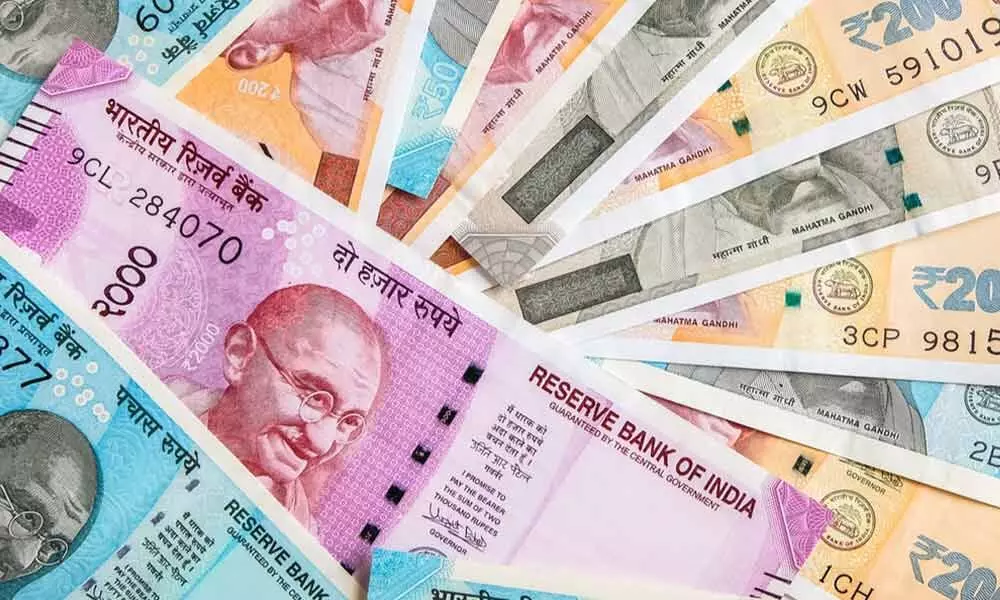People hoarding cash as Covid rages
Experts say people withdrawing large amounts from ATMs, but still spending more through digital means
image for illustrative purpose

New Delhi THE Covid-19 pandemic has brought about a behavioural change in usage of cash with people withdrawing larger amounts from ATMs but preferring to make digital modes to make payments, said experts.
The ferocity of the second wave of the coronavirus pandemic has scared people, forcing them to withdraw larger amounts from the ATMs with a view to avoid frequent visits. The money thus withdrawn is mostly held for emergency use and often payments are being made through UPI and other digital modes.
Talking about the behavioural change in currency usage, Sarvatra Technologies founder and MD Mandar Agashe said that in view of the lockdown and social distancing norms, people are not venturing out to banks and ATMs as frequently. "The average ticket size of withdrawals at any given time has gone up by almost 20 per cent, as people withdraw in larger quantities and prefer to hoard, pre-empting medical or any other form of emergencies, which ultimately is not consumed as much.
"The average ticket size of withdrawals which earlier ranged between 2,000-3,000 now has invariably gone up by 20 per cent to Rs 3,000-4,000 across both rural and urban India," Adashe said. He further said UPI was taking care of small-ticket transactions with the average ticket size constant at Rs 1,000. Owing to this behavioural shift, daily average transactions on IMPS have now gone up to Rs 9,000 which was earlier in the range of around Rs 6,000-7,000, he said.
"The second wave of the pandemic has had a significant impact on the handling and management of cash. "This has in turn brought about substantial shift in behavioral patterns among the masses which will play out in favour of digital transactions in the long run," he added. Immediate Payment Service (IMPS) is an instant interbank electronic fund transfer service through mobile phones. According to the RBI's latest data, the outstanding currency in circulation on May 7 was Rs 2,939,997 crore, up from Rs 2,858,640 crore on March 26. Care Ratings Chief Economist Madan Sabnavis opined that during these uncertain times, there is a preference for people to hold down to cash. It is more for precautionary purposes because one needs cash for rainy days such as for medical reasons or for any sudden other expenses, said Sabnavis. PayNearby founder, MD and CEO Anand Kumar Bajaj said the anxiety of lockdowns has forced people to withdraw money and to keep cash handy — both for medical emergencies and basic needs in these dire times. This surge in cash usage indicates that people have started to accumulate cash in anticipation of more stringent lockdown measures that might be announced to curb the pandemic, he said.
Additionally, as a counter-measure to offer relief and sustenance to the crisis-affected migrant workers and low-income cohorts, the government has disbursed direct benefit transfer (DBT) to millions of Pradhan Mantri Jan Dhan Yojana (PMJDY) beneficiaries, he said. Aadhaar ATM, which is the backbone for disbursing DBT to citizens, saw a huge surge across all PayNearby retail stores, primarily led by increased adoption in rural, semi-urban and tier-II towns, Bajaj said. "Our annual figures reported AePS (Aadhaar-enabled Payment System) withdrawals worth Rs 10,000 crore in Q4 FY2021 as against Rs 7,650 crore vis-à-vis the same quarter last year. "So, withdrawal of DBT funds can also be considered a significant reason for high cash in circulation, especially in the rural economy," he said. mPokket founder and CEO Gaurav Jalan said there was a tremendous uptick in digital transactions following demonetisation in 2017, as currency usage slumped.
"Even as penetration of digital payments continues to grow and become a more important part of consumer spending patterns, currency in circulation has also seen significant growth. "This suggests that although consumers find digital payments convenient and easy, they continue to prefer cash as a medium for certain types of transactions," he said. Spice Money CEO Sanjeev Kumar said that at Spice Money, "we have witnessed a whopping annual growth of 124 per cent in AePS services in 2020-21 with transaction value being more than Rs 30,000 crore. Our daily Aeps transaction has witnessed an all-time high at Rs 165 crore".
Khaitan & Co Partner Abhishek A Rastogi said people want to keep money liquid and handy for emergency needs. "Further, the risk of catching infection by going to the bank for depositing/withdrawing is high and is generally avoided in these times." Further, hospitals have been recently allowed to accept cash even beyond 2 lakh on receipt of PAN and Aadhaar card. "In such situation, people want to keep more cash handy and avoid banking channels for payment. The cash usage would have gone even higher in case cash is readily accepted by e-commerce companies as 'cash on delivery'," he opined.
Public in favour of Cash
- Anxiety of lockdowns forced people to withdraw money and to keep cash handy for medical emergencies
- The average withdrawals which earlier ranged between 2,000-3,000 now have invariably gone up by 20 per cent to Rs 3,000-4,000
- UPI is taking care of small-ticket transactions with the average ticket size constant at Rs 1,000

